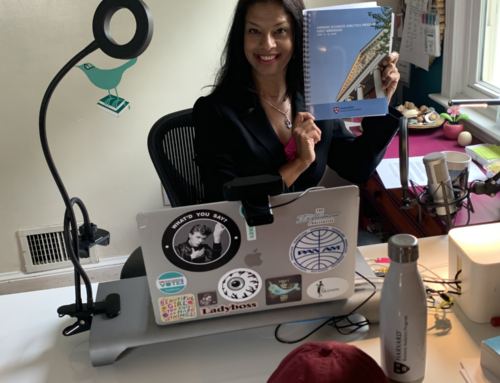 Yesterday, I came across a really interesting post by John Jantsch that posited “it’s time to purge the word entrepreneur”.
Yesterday, I came across a really interesting post by John Jantsch that posited “it’s time to purge the word entrepreneur”.
In part, John wrote,
“The issue centers on the notion that if you’re an entrepreneur you care about high growth and if you’re a small business owner you’re somehow destined to struggle to make ends meet while working your fingers to the bone.”
and
“You can view your business as an entrepreneurial high growth machine and still work your fingers to the bone with little to show for it and you can create a little lifestyle small business that pays your handsomely and affords you the time to take in the world. So, what’s the distinction now?”
You should read the post, because it’s very interesting, as are the comments (people offer so many definitions of “entrepreneur” it will make your head spin).
What is interesting to me – and something I’ve been thinking about a lot the past few months – is how we define our own businesses. And when I say “we,” I mean most of the people I know who, like me, are practicing their trade independently, and mostly without employees.
Are we freelancers? Consultants? Entrepreneurs? Small business owners?
Personally, I’ve always gravitated away from “freelancer.” To me, there is an implied impermanence in that word, that one hops from project to project while looking for a “real” job. I also know people who’ve been “freelancing” for years, and are quite happy that way.
Many people I’ve come into contact with over the last few years who call themselves consultants are basically doing the same thing. Got laid off? Got fired? Quit because they got tired? They’ll become “consultants” until they get their next job.
Now, I understand the financial need to do this. But using that word in that context just seems a bit waffly to me (one could always use “professional” instead).
What am I?
I am an independent consultant. And there are extremely large firms that do exactly what I do. They just do it on a much larger scale. No one would hesitate to consider them a “real” business. But by virtue of the fact that I work for myself, and not for such a firm or a “regular” agency, sometimes people assume that I’m doing this while in between jobs.
Here’s the thing; I’m not a temporary consultant. I’m not going anywhere. This is why I also say, on my website, as well as when people ask me “what exactly it is that I do,” that I’m “an agency of one.” Because, for now at least, that’s what I am, and what my business is.
And when it comes to deciding whether I’m an entrepreneur or a small business owner, I’ve simply assumed that I’m both.
Two factors – risk and management – are common to most definitions of the word “entrepreneur” that I’ve seen; some include “initiative.”
Check, check and check
I am a small business owner. Granted, it’s a very very very small business, but it is a business. I don’t play around with my work or clients. I look at my numbers, have projections, pay taxes, etc.
I’ve also assumed that by virtue of striking out on my own – which is a risk – I am an entrepreneur as well. Granted, I don’t have the idea for the next Google+ or whatever, but I am bearing risk and managing my business.
And I do think it takes some initiative to strike out on one’s own.
In my head
For me, thinking of myself as a small business owner has been incredibly important to the way I approach my business. I am not here-today-gone-tomorrow. I run a business which has to turn a profit else I’m up the creek without a paddle. Not only that, I have to figure out how to scale my business beyond the “micro” stage.
If I thought of myself as a freelancer, I don’t think I’d get there.
I want to make it clear that I mean no disrespect to those who have been, or consider themselves, lifelong freelancers. Joanna Pineda‘s post on what kind of business you want to create resonated strongly with me and, as she points out (as does John Jantsch), successful freelancers can live a very comfortable lifestyle indeed. It’s simply not how I perceive myself, or my business.
Whatever your approach, I think it is incredibly important to get exactly who and what you are right in your head when starting out. Otherwise, it will be very difficult to communicate that to potential clients and customers, and your business will get off on the wrong foot.
Positioning doesn’t start on the outside. It starts in your head. And at least as far as your business is concerned, it will be your defining moment.
But enough about me… what do you think? How do you think of your business?
Image: incurable_hippie via Flickr, CC 2.0







[…] a reason we use the term “investment” when referring to time spent building our business. Sometimes that time investment necessarily overwhelms time spent anywhere else in our lives. […]
@bsaunders That is a really interesting distinction, Barbara. And I also love this line, “I am the person who dispatches the worker who happens to be me.”
I am a writer who found niches in marketing and communications, as opposed to a marketer or communications professional who specializes in writing. So I have a different perspective on the distinction between “freelancer” and “consultant.” Consulting, to me, implies giving advice or having responsibility for setting goals and creating systems. Sometimes I do that. At other times, I do pure creative production. I refer to the latter as freelancing. In my small business owner hat, I am the person who dispatches the worker who happens to be me.
@KDillabough@3HatsComm That made me smile too!
@ShakirahDawud I can only speak from my own experience, but it’s taken me about three years for my mindset to start changing. I’ve been thinking a lot about scale too, which is partially where this post came from.
I’ve also been thinking more about what @KenMueller said below about identifying with clients because he’s one of them. I’m not so sure that holds true for me. I can empathize with a wide range of clients, be they small or large businesses, because their situations are those which I’ve been in or had to deal with. I think I lean more towards @John Falchetto ‘s statement that he’s a “small business owner” for tax reasons (or, in the U.S., for funding reasons).
But more and more, I believe I am a “small business owner” (remembering that the SBA’s definition of small businesses, in terms of income, is nothing to sneeze at), but I deliver world-class service and results. I don’t skimp on the right software, vendors, etc., so I’m equally equipped as “large” agencies are to deliver quality work… and, because I’m not a behemoth and results-focused, I’ll probably deliver better work. There’s nothing small about that, right?
@ShakirahDawud Always look for the common ground and shared experiences. I think it’s always great when we can relate to their experience. When they throw their hands in the air with an objection, I can say, “Hey, I’m a one man shop. You’re not telling me anything I don’t know!”
@KenMueller I only recently realized I could connect with other small business owners the way I do because I’m one of them.
Hmmm. I seem to find more people of my stripe when I google “freelance.” So I think most of us freelance writers think of ourselves that way, because that’s how we find ourselves–that’s how we get introduced to the business. But I’m not referring to myself that way outwardly very much anymore. I’ve begun to add the word “independent” to describe myself instead. As you wondered with @KenMueller , how do SMB owners know when they’re no longer SMBs? What’s scale here? The same I’ve thought of startups and entrepreneurs. I agree with @John Falchetto that it’s a mindset, but how and when does that mindset metamorphose, and to become what?
[…] a reason we use the term “investment” when referring to time spent building our business. Sometimes that time investment necessarily overwhelms time spent anywhere else in our lives. […]
@3HatsComm@Shonali@MattLaCasse@John Falchetto Davina, you always make me smile: “a hot mess of everything”…too funny!
@Shonali@MattLaCasse@John Falchetto@KDillabough It is in our own head which is my ‘problem’ as in my head, it’s a hot mess of everything sometimes. ;-)
@3HatsComm That (despair) is hilarious!
I saw your “hire me” post but haven’t been able to comment (though I don’t know if it’s too late now, or I just pick up the phone and talk to you, which is long overdue anyway).
Yes, I do see how the explanation (or tag line) may change with the audience… but for me it’s more about how we see ourselves internally as a starting point…
@MattLaCasse@John Falchetto@KDillabough
@MattLaCasse Well said, my friend. Thank you!
@KDillabough Writing a blog post comment is a sure sign you had something to say, right nittygriddyblog ? :p I love it – please don’t apologize!
I think you’re absolutely right about the WIIFM bit when people consider doing business with you. But I think that unless we recognize all that we are, and how we want to be perceived, they may not get the right impression.
Specifically from a structural point of view, though, I think it does make a difference as to what “kind” of business we perceive ourselves to be. ‘Cos i I don’t convince myself, how the heck will I convince anyone else?
@Shonali@John Falchetto well, i don’t know. I have some larger clients, that by definition are still considered “small businesses”. I’ve also got one international non-profit which wouldn’t be a small business. But like you, it’s just me. I can’t escape being a small business. I think it’s a healthy mindset that keeps me focused.
@KenMueller That’s really interesting, Ken. Do you think that, as you get larger clients, you’ll stop thinking of yourself as a small business owner? And will that change your business model in any way? @John Falchetto
@John Falchetto I love the way you break those down, John. But hey, you forgot to mention husband… !
I read John’s post earlier and it’s always a case of perception. Like @MattLaCasse said, ‘freelancer’ does have a certain stigma to some but to others, it’s more relatable than a ‘consultant.’ Some see ‘consultant’ as you describe, just in between jobs or worse, like Despair does http://despair.com/consulting.html which I of course think is totally funny. Agreeing w/ @John Falchetto and @KDillabough that explanation my vary per my audience, this is something I tried to do with my ‘Hire Me’ post – explain that I am a professional, I run my own business and what I can do for others. Which is the hardest part for me – wearing many hats as needed, finding that ‘defining’ term and closest I’ve gotten lately, professional communicator. FWIW.
When it boiler down to it, how you approach your life is all about how you define yourself to yourself. The word freelancer certainly holds a certain “stigma” if you will, while entrepreneur holds something else.
I think small business owner is synonymous with entrepreneur. Both are committed to driving their endeavours forward, and are experts at what they do.
@shonali , this is such a good and timely post. As I’m narrowing my focus online and concentrating on my niche, I still find it interesting that people really want to label you/ put you in a box/ give you a title, and then make and draw their own conclusions (and rightly so) about that title.
When I’m asked, “What do you do?”, I respond with a smile: “What do you need done?” It always breaks the ice, gives pause for a little smile, and allows me to talk in terms of what I can DO FOR YOU, as opposed to what I do. So I am indeed struggling with that “label”. Am I a coach? Yes. But am I a business coach or life coach? Yes. Am I a consultant/ strategist/ mentor/ muse/ pat-on-the-back-kick-in-the-shins accountability partner/ objective ally and guide? yes, yes, yes. But that doesn’t fit on a business card, haha!
Because words are so important, it is indeed vital to identify not only, in your words Shonali, “who and what you are in your head”, but more importantly, what you do FOR people…the significant, beneficial results they achieve by working with you, or the wonderful feelings and benefit they get from interacting, communicating and “hanging out” with you socially: online and off.
People want to know the WIIFM…”what’s in it for me” when they engage in business with you. So really, whatever the starting point is, perhaps it is really more the recipient’s perception of who you are, what you do and what you do for them that really counts. I don’t have an easy answer, because I wrestle with this ongoing. Business coach/consultant has worked. Business coach/strategist has worked. But I haven’t really found that “perfect title” that resonates to my core, and really describes what I do for those I work with.
I like @KenMueller comment: “we all have a lot of names or titles we wear, sometimes simultaneously. We have to choose which ones we wear, or let others choose them for us.” Quite frankly: my clients, customers, friends, associates can call me what they wish, once I’ve clarified for them what significant, beneficial difference I can make in their lives. Well, almost anything, haha! Cheers! Kaarina P.S. Crap! I think I’ve hijacked and written a blog post here. Sorry ’bout that @shonali
@pasmithjr Thanks, my friend.
@johnfalchetto Thank you for sharing, as well as for the comment!
I like your approach to this. I read John’s post yesterday, and I do agree with him in part. While I am an entrepreneur, I try to see myself as a small business owner, first and foremost, mostly because that’s who my clients are. I can identify with them much better if I see myself as one of them. As @John Falchetto mentions below, we all have a lot of names or titles we wear, sometimes simultaneously. We have to choose which ones we wear, or let others choose them for us. Either way, we need to make sure we are defining them, and communicating them to others, on our terms.
Hi Shonali,
I see myself as a business owner. Period. Entrepreneur for me describes a mindset. Small business owner is a legal description for tax reasons.
Freelancer, well this always meant someone who is looking to find a place in the market.
Consultant is a very fashionable word these days, everyone is a consultant of something.
I guess it really boils down to the audience. When my taxes arrive I’m a small business owner. For my clients I’m a coach. For my daughter I’m dad.
The last one is the one which matters most to me :)